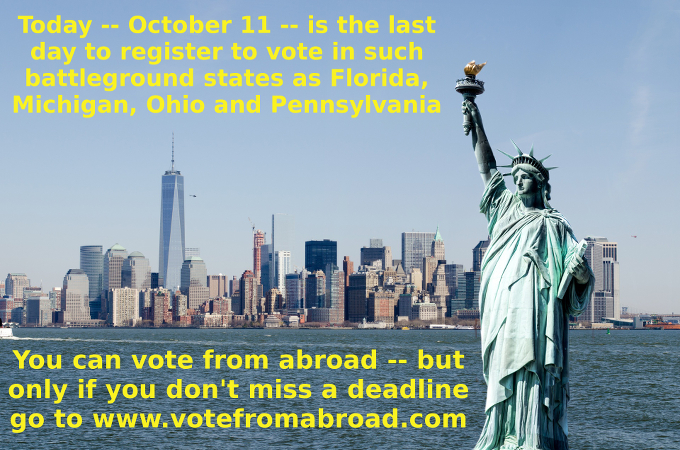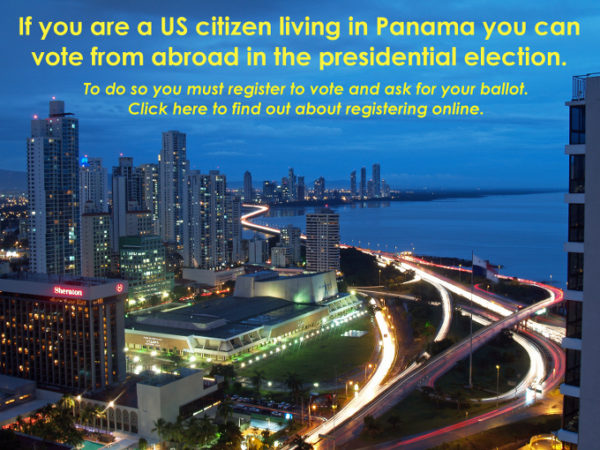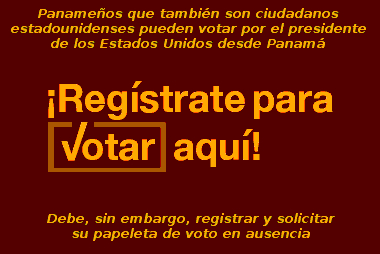
Breaking Update: By court order Florida’s voter registration deadline has been extended by one day, until October 12
Diasporas, mad cartoonists
and your right to vote
by Eric Jackson
Diasporas almost always begin as an awful trauma, whether for an individual, a family or a nation. It’s especially true when the move is forced, but the sorts of forces that drive people to leave their countries often defy neat descriptions. In the Babylonian Captivity and the Middle Passage, defeated people were taken away to lives of hardship and servitude. Often, however, there is no authority telling people that as a matter of law or political edict they must leave their homes, but the ravages of war, famine, plague or drought make the old life in the old place untenable. The historic collective memories of such events echo today in those sectors of the American electorate who are descended from those who were taken by force from Africa, time and again driven from place to place for their Jewish ethnicity or religion, driven out of Ireland during potato famine, compelled to leave many a land torn by war or so on.
But along the way, diasporas tend to morph, partially reverse and feed beautiful things growing out of the sorrow. People intermarry, assimilate into new languages or cultures, maintain old ties, move back and forth, pass old ethnic wisdom on to new generations and change the societies into which they have moved. Americans have jazz and all of its offshoots, pizza, Hollywood culture, country music, urban political organizations, the US status as a great scientific power and many other thoroughly assimilated parts of the nation’s life as the direct results of how grim migrations that washed onto North America’s shores evolved into happier things.
And some of us went back, keeping our US citizenship and our various strange cultural mixes. Americans also affect the cultures, economies and lives of places where we go, or to whence we return.
It’s a big threat to some. If the Ku Klux Klan had their way back in the 1920s, Americans wouldn’t know the concept of a pepperoni pizza. If their contemporary political heirs have their way, California avocado growers would be ruined by the suppression of Cinco de Mayo festivities. There is a Panamanian demagogue or two who would kick all the gringos out, along with other foreign elements, even though there has been an American community here since the 1840s.
The other day those descended from the builders of the original Panama Canal — most of whom were black people from the West Indies — marched through one of their diaspora strongholds, Brooklyn. It was beautiful. But to some, it was a big threat. Not for any reason. Fear and hatred for no reason, or for imagined or extremely exaggerated reasons, is the basis for so much of US politics these days.
But Americans living abroad — of the “non-ethnic” polyglot unilingual middle culture, from the various spectra of dual citizens, of “ethnics abroad” now living in third cultures — we tend to have life experiences that make us know better. No census data are handy, but it is often and credibly estimated that there are at least eight million of us if you count by citizenship. We have the right to vote and our special ringside seats from which we observe world events. All Americans benefit from our input in the US national discourse.
Sometimes, however, diasporas and assimilations get deluged by new waves, distorted by international hostilities, exploited for economic or political gain or marginalized by ignorance or design. Consider, for example, America’s oldest non-indigenous ethnic community, the Cuban-Americans.
You may object. A group of 100 English settlers founded Jamestown in 1607, and the Pilgrims landed on Plymouth Rock in 1620. But San Agustín, now St. Augustine, was founded as a Spanish-speaking town with close ties to Cuba in 1565 by the Spanish Admiral Pedro Menéndez de Avilés. A stop along the trade route between Spain and Cuba and then points beyond, people came and went and a Cuban-American community was well established before there was a United States of America, a State of Florida or a Republic of Cuba.
That great independence advocate whose legend is embraced both by the present government of Cuba and its most ardent Cuban and Cuban-American foes, José Martí? He spent much of his life in the United States. The grand-daddy of teams in the old Negro Leagues that existed before baseball was integrated in the wake of World War II? Those would be the Cuban Giants, originally of New Jersey, which had a Cuban-American following even if not so many Cuban players.
And out of New Jersey’s Cuban-American community came the man who made Mad Magazine’s publisher Bill Gaines rich, Don Martin. Many of his fans had no idea of any ethnic identity — he was the teller of weird tales involving middle class male angst and strange onomatopoeia.
Then a Cuban exile came to Mad, the great Antonio Prohías. Mr. Prohias headed the Cuban editorial cartoonists’ association before and during the revolution and at the time Fidel Castro lauded his lampoons against the old regime. Then after the revolution Castro wanted safely obedient cartoonists and Prohías wasn’t one of those. Taking very little with him, he made his way to the United States. But he didn’t become one of those mouthpieces of the Cuban exile leadership, much of which reviled him before the revolution and was looking for hardcore counter-revolutionaries, the most ultra of Cold Warriors. Actually, with his Spy vs Spy strips in Mad, Prohías was an inspiration to a generation that rebelled against the Cold War and its most outrageous failure, the Vietnam War. His depictions of morally indistinguishable operatives hatching ruthless plots against one another took root and is an enduring theme in American culture.
Back in Cuba, there is an underground that reveres the memories and works of the now departed Martin and Prohías, but the US embargo has all but paralyzed the back-and-forth cultural crossbreeding that characterizes the social relations of the United States with most of the rest of the Americas. It also means that there is a negligible absentee vote cast by US citizens and Cuban-American duals from the island of Cuba.
In this strange election year one side of the divide would make sure that there are no ballots cast from Cuba, except perhaps from military personnel ordered to torture people at Guantanamo Bay. They don’t like Cubans or Cuban-Americans but want the votes of the latter, figuring that in Little Havana they hate the Castro brothers enough to elect someone who hates everything for which Little Havana stands, and hates all of its residents as well.
Sadly, this election comes without Martin and Prohías among us to draw jokes that are obliquely about it. Let it not come without the millions of American voters who live abroad lending our wit and wisdom to the process. The deadlines are here. Register and vote now.
~ ~ ~
These announcements are interactive. Click on them for more information.
Estos anuncios son interactivos. Toque en ellos para seguir a las páginas de web.












